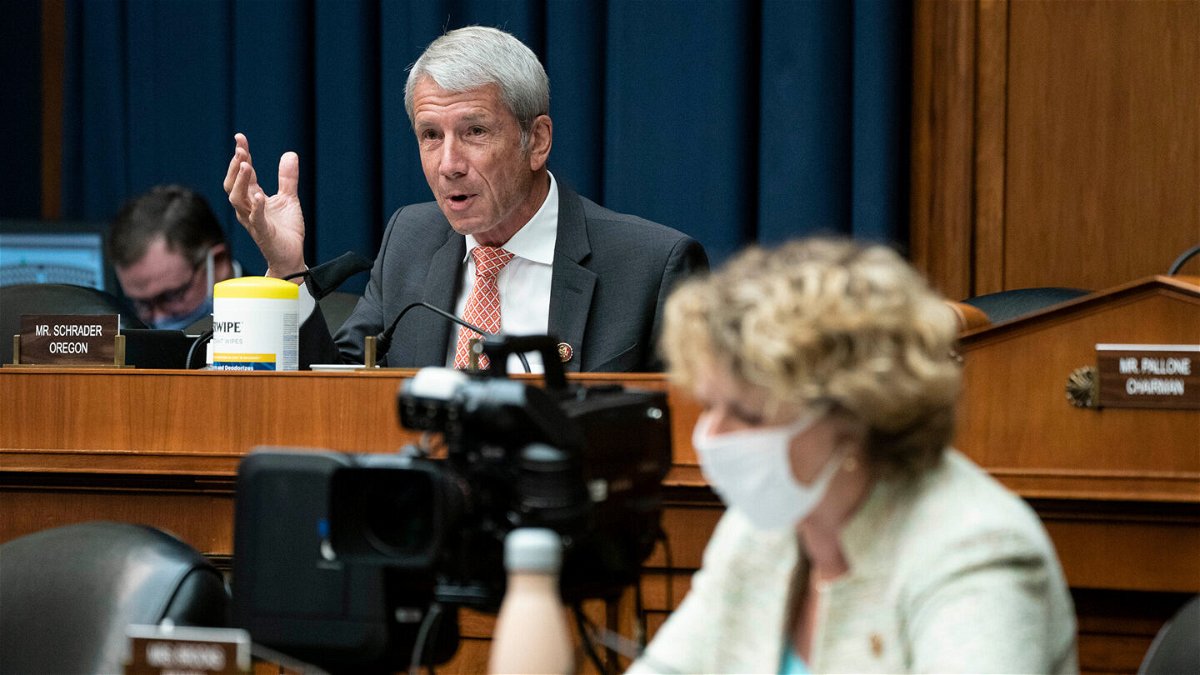Democratic resistance to drug pricing plan underscores dilemma for party

Democratic Reps. including Kurt Schrader of Oregon
By Annie Grayer, Clare Foran, Kristin Wilson and Tami Luhby, CNN
A small group of House Democrats voted against key drug pricing provisions on Wednesday in two separate committee markups, underscoring the challenges the party is facing to stay united as it races to finalize sweeping legislation to expand the nation’s social safety net.
Democratic Reps. Scott Peters of California, Kurt Schrader of Oregon and Kathleen Rice of New York voted against a proposal to allow Medicare to negotiate lower drug prices during a markup in the House Energy and Commerce Committee. With the three “no” votes, the drug pricing section of the larger package the panel was considering came to a tied vote and failed as a result, foreshadowing the problems ahead for Democratic leadership, which can only afford to lose three Democratic votes when the measure is brought to the chamber’s floor.
But, the setback in the Energy and Commerce Committee does not mean it’s the end of the line for the provision, as a similar proposal passed out of the Ways and Means Committee on Wednesday, which means the measure can still make it into the final version of the bill.
Democrats have estimated that the drug pricing provision would raise about $700 billion, which they need to cover the cost of their $3.5 trillion proposal. Without the provision, Democrats would have a significant gap in financing, especially as some in the Senate have argued they want the plan to be fully paid for.
During a Ways and Means Committee markup also on Wednesday, moderate Democratic Rep. Stephanie Murphy of Florida voted against the entire package, which included the proposal to allow Medicare to negotiate drug costs.
In a statement after the vote, Murphy, who has been part of a group of moderates to continue to voice concerns about the sweeping economic spending package, said that there are “spending and tax provisions that give me pause, and so I cannot vote for the bill at this early stage.”
Murphy, however, did not signal how she would vote on the overall package, saying she remains “optimistic” that the final product “will be appropriately targeted and fiscally responsible.”
Even though the drug price provision can make it into the final version of the bill, the pushback from moderates over the issue makes clear how difficult it is going to be for Democrats to remain united and pass the final legislation. Senate Democrats, who control only 50 seats, will need to be completely in step to pass the legislation.
White House spokesman Andrew Bates said in a statement Wednesday that “the President agrees with Speaker Pelosi that it in order to build an economy that delivers for the middle class and working families — not just those at the top — it is critical we empower Medicare to directly negotiate for lower drug prices.”
In a sign of tensions over what to include in the massive economic package, Vermont Sen. Bernie Sanders, an independent who caucuses with Democrats, criticized the vote by the trio of Democrats in the Energy and Commerce Committee, saying in a statement that he was “very disappointed.”
“I understand that the pharmaceutical industry owns the Republican Party and that no Republican voted for this bill, but there is no excuse for every Democrat not supporting it,” Sanders, the chair of the Senate Budget Committee, said.
At issue is a measure that calls for requiring the Health and Human Services secretary to negotiate maximum fair prices of at least 50 and as many as 250 high-cost medications that lack competition, including insulin. The price would be available to Medicare beneficiaries and to individuals enrolled in group health plans. A Congressional Budget Office report has said it could save the federal government $456 billion over a decade.
The House passed a similar bill, also backed by Pelosi, in 2019 by a vote of 230-192. At the time, the speaker had a tough time locking down support from progressives, who complained the bill wasn’t aggressive enough.
Democrats have long pushed to reduce drug costs by allowing Medicare to negotiate prices, though some of their Democratic colleagues, as well as GOP lawmakers and the pharmaceutical industry, have opposed it. High drug prices are often among Americans’ top health care complaints.
The drug price proposal would also require manufacturers who increase their prices faster than inflation to pay back the excess amount to the federal government, which would benefit enrollees in Medicare and employer-sponsored plans. And it would add a cap to out-of-pocket costs in Medicare drug plans for the first time. Beneficiaries would each pay no more than $2,000.
Additional savings would come from blocking the implementation of a Trump administration regulation that called for changing the rebate system within the drug industry.
Peters and Schrader, saying they would vote against the provision, put forward an alternative proposal that they say would still lower out-of-pocket drug costs.
The pair’s proposal aims to lower drug prices through negotiation, but under a narrower set of parameters. It would allow Medicare to negotiate drugs administered in doctors’ offices that no longer have exclusivity and for which there is no competition on the market. The HHS secretary could negotiate to secure price concessions of between 25% and 35%.
The-CNN-Wire
™ & © 2021 Cable News Network, Inc., a WarnerMedia Company. All rights reserved.
CNN’s Lauren Fox contributed to this story.